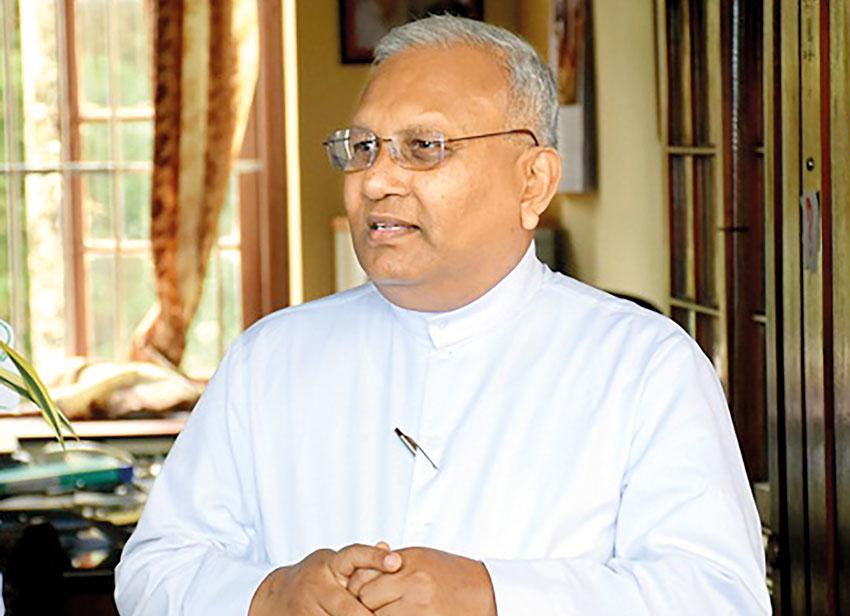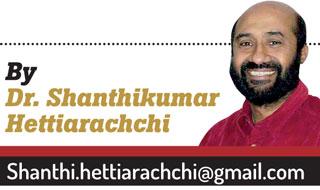Reply To:
Name - Reply Comment

Fr. Elmo’s smile had become infectious during his parish life; whether it was Kepungoda, Tibbotugoda, Ratmalana, Indigolla, or Modena (Italy)
Fr. Elmo was a dedicated man, but was stern in his principled approach and actions and would not mince his words
He believed in ‘a life beyond this life’ like John Donne and that it is sufficiently comforting for his family, because ‘he ran his life’ meaningfully
 He passed away 2 years ago (August 14, 2019) and I thought of reflecting upon a friend priest and a priestly icon. He was non other than the late Fr. Elmo Clarence Dias, a Moratu Puthra. He was our head prefect during our teens in the minor seminary, the dean of the Ampitiya major seminary in his final year of theology. Fr. Elmo became its Rector for ten long years. As a junior priest, Fr. Elmo began his ministry in the parish of Pamunugama, Kepungoda and Dungalpitiya alongside a charmingly beloved Flemish priest Fr. Moyse OMI. Fr. Elmo, remained active until a stubbornly vicious cancer took him away from us prematurely. He was a tough willed man of principles, characteristically uncompromising for the greater good and more importantly with an untainted loyalty towards true friends. He had an apostolically impatient love for the church and people.
He passed away 2 years ago (August 14, 2019) and I thought of reflecting upon a friend priest and a priestly icon. He was non other than the late Fr. Elmo Clarence Dias, a Moratu Puthra. He was our head prefect during our teens in the minor seminary, the dean of the Ampitiya major seminary in his final year of theology. Fr. Elmo became its Rector for ten long years. As a junior priest, Fr. Elmo began his ministry in the parish of Pamunugama, Kepungoda and Dungalpitiya alongside a charmingly beloved Flemish priest Fr. Moyse OMI. Fr. Elmo, remained active until a stubbornly vicious cancer took him away from us prematurely. He was a tough willed man of principles, characteristically uncompromising for the greater good and more importantly with an untainted loyalty towards true friends. He had an apostolically impatient love for the church and people.
There was a frequent visitor for Fr. Elmo during our minor seminary days who used to visit him with ‘food and T shirts’. It was his youngest sisiter Merlin Dias (who passed away in March 2021) who with her generosity and on behalf of the family who brought these goodies practically every week. Fr. Elmo shared these with us.
Fr. Elmo was a loyal friend, but one had to know him inside out to befriend him. He was hard to reach for ingenuity, callousness and petty relationships. He sought depth in relationships. In Buddhist understanding such is called Kalyāamitta
Fr. Elmo remained the most formidable linkage of this large clan of nearly 60 with the second and third generation of nieces and nephews and the grand children of his brothers and sisters. They formed an impressive set of relatives. They continue to grieve and feel the untimely loss of their brother-priest. He loved his late mother (Margret Dias) profusely. She was a giant influence on his life, his late dad (R. S. A. Dias), was a quiet man, but raised this large family with his wife; who mothered this clan until she saw her great grandchildren. Her smile was exactly what Elmo seemed to have emulated. Fr. Elmo’s smile had become infectious during his parish life; whether it was Kepungoda, Tibbotugoda, Ratmalana, Indigolla, or Modena (Italy). People flocked to this kind pastor who was agile, dexterous and generous and able to work with fortitude and insight.
Ampitiya was his second home and anyone, who had received one year of training, would fall in love with this magnificently historical, the then papal seminary, now Sri Lanka’s premier asapuwa of training of future priests
The family for him was an energizing factor during his priestly life. His cordiality with the band of five sisters four brothers with him 10 siblings was perfect. So was the struggle for her to raise this family as the longest survived single-parent. No doubt that Elmo was the strongest rallying point for this ‘Dias family of Moratuwa’. I know for sure whenever he had the opportunity, he visited from family to family pastoring them making sure that they were happy and content.
Fr. Elmo was a loyal friend, but one had to know him inside out to be friend him. He was hard to reach for ingenuity, callousness and petty relationships. He sought depth in relationships. In Buddhist understanding such is called Kalyāṇamitta (A true friend in Pali). Him/ her displays qualities to have faith, be virtuous, learned, liberal and wise. These thoughts are further explained with much rigour by Bhikkhu Buddhaghosa in the Visuddhimagga (III. 78-82) as mentioned in the Sayutta Nikāya of the Suttapitaka (132.) He with his death has become a samsaric mitta to some, but in his faith he was committed to the Lord and service to humanity. We theologically and doctrinally disagreed on many issues, but he never crossed the sacred path of dialogue. If we did reach a point of severe disagreement we moved gracefully to a story of our teens in the minor seminary or of the celebrated living in the hallowed portal of the Ampitiya seminary.
Our protagonist Fr. Elmo Clarence Dias celebrated his life with his family and with us as a son, brother, priest, friend and a kind smiling pastor. It may be that all of us would not have known the moment of death, but he knew that his life was well spent during a span of 67 years
Fr. Elmo was a dedicated man, but was stern in his principled approach and actions and would not mince his words if those principles were crossed. I am aware that many superiors including some bishops and priests of the archdiocese, especially during his tenure as the Rector of the major seminary, were notably indulging to drive their agendas, but he stood strong. This, I am sure he learned humbly during his tenure as the secretary to our beloved Rector and Archbishop, the late Nicholas Marcus Fernando, his respected superior and sagaciously close friend (a mitta, truly in Buddhist sense in my view) whose episcopal motto was ‘to speak the truth in charity’ (Veritatem dicere in Caritate). Fr. Elmo’s loyalty to this episcopal motto was profusely par excellence that many others probably tolerated. Archbishop Fernando and Fr. Elmo remained Kalyāamitta, until and they both passed away within two weeks apart and were most honourably laid to rest; one in Moratuwa and the other in Negombo- the two main Catholic bastions in the archdiocese. The 5th century CE. bhikkhu Buddhaghosa was spot on in his interpretation of the Samyuttanikaya – ‘they crossed the saṃsāra alongside each other’. May they rest in their Lord’s presence, which Lord I wondered always as both Jesus and the Buddha are called the Lord in Asia.
Elmo’s Ampitiya
Ampitiya was his second home and anyone, who had received one year of training, would fall in love with this magnificently historical, the then papal seminary, now Sri Lanka’s premier asapuwa of training of future priests. Fr. Elmo was fascinated by Ampitiya’s scenic beauty. But his love of the land and soil, in fact was formed as our DNA at Hawarden, Haputale during our the intermediate training under the keen, but uncompromising direction of late Fr. Anslem Croos. His view was that “if we have land and labour then we must be self-sufficient and reap the best of the land and the soil”, in keeping with the Benedictine’s motto Ora et labora (pray and work) but Anselm added fun (amet), with his humor, rapture and his ‘born free’ attidue towards life. The 2015 papal encyclical Lautato si (Mihithalaye Geethaya) is what Pope Franics describes and that which Anselm and Elmo subscribed to. Rare breeds indeed, hard to fetch these days.
Irish poet John Donne in his sonnet ‘Death’ confronts death. That “death is one short sleep past” only. He radically tells the readers that “we wake eternally, and death shall be no more; Death, thou shalt die”, because humans have imaginatively found ‘a hereafter’ and even to provide death a meaning. Such beliefs reconcile absurdity that challenges human existence. Some die prematurely, while some others suffer terminally of various ailments, but death shocks us all when it occurs. Especially when the younger people succumb to it, challenging the foundations of very faith they have held on to; more so now with the Covid-19 pandemic with death and desolation in our neighbourhood.
Our protagonist Fr. Elmo Clarence Dias celebrated his life with his family and with us as a son, brother, priest, friend and a kind smiling pastor. It may be that all of us would not have known the moment of death, but he knew that his life was well spent during a span of 67 years. He believed in ‘a life beyond this life’ like John Donne and that it is sufficiently comforting for his family, because ‘he ran his life’ meaningfully, like Paul says in the Second Testament, and left us all with a legacy of a bhatu (brother) kalyanamitta (friend), a committed savaka (disciple) of his Lord.